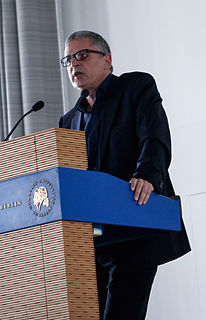A Quote by Arancha Gonzalez
The fact is that during the post-1989 heyday of globalization optimism, political and business elites did not think enough about the prospect - plainly predicted in economic theory - that trade would harm some people even while leaving society as a whole better off. The result was overpromised benefits and inadequate adjustment plans.
Related Quotes
What makes globalization even possible in the first place? One answer would be that it requires the regularization of some kind of media and communication infrastructure. When you have that, you might get globalized economic trade within some political or imperial framework, but it is likely you'll get transnational cultural flows as well. Globalizing trade can lead to a cosmopolitan culture, but also to all sorts of nationalistic or racist or patriarchal reactions to those as breaches of imaginary communities.
It (the Chinese move to embrace capitalism in 1989) is a mirror of the corporatist state first pioneered in Chile under Pinochet: a revolving door between corporate and political elites who combine their power to eliminate workers as an organized political force. The creation of today's market society was not the result of a sequence of spontaneous events but rather of state interference and violence.
I think about quitting all the time. I'll take such a little thing and be like, "I quit! I've had enough of you people!" And then...I don't know, it gets better. I'm not really good at making plans so I don't have any definite plans for the future. I would love to have a family and kids at some point.
Since I live part of the year in Italy, I live in a society in which I'm the optimistic American relative to the people who I'm around there. And that has actually brought to my attention the fact that I do have some sort of optimism and has made me think about it enough that I can attempt an answer.
If you think about what folks have been doing for 20 or 30 years, they have been bottling frustration and resentment that the political elites don't understand them, that the political elites don't care about them, that the political elites judge them in various ways. All Donald Trump does is provide the opposite of those things.
It hurts to see that everything on television is based on pillaring people. Nobody's sort of given the opportunity to be nice anymore. I think that is somewhat reflective of tragically the society that we live in today where we want to know people off their pedestal or we want to hurt, we want to harm instead of boosting and following by example. It's always about the crud of society, the black sheep of society that producers seem to think the public wants rather than my old theory of the cream rising to the top.
I stare into a thin, web-like crack above the urinal's handle and think to myself that if I were to disappear into that crack, say somehow miniaturize and slip into it, the odds are good that no one would notice I was gone. No... one... would... care. In fact some, if they noticed my absence, might feel an odd, indefinable sense of relief. This is true: the world is better off with some people gone. Our lives are not all interconnected. That theory is crock. Some people truly do not need to be here.
If you find common subjects or interests with a prospect, you can establish a business friendship. Ask about a diploma or picture. Your prospect will be glad to talk about what he/she just did or likes to do. Try to captivate him or her in intelligent conversation with engaging questions about their interests. It's obviously better if you're versed in the subject, because that's where rapport is established. Get the prospect to talk about their passions and what makes them happy.




































